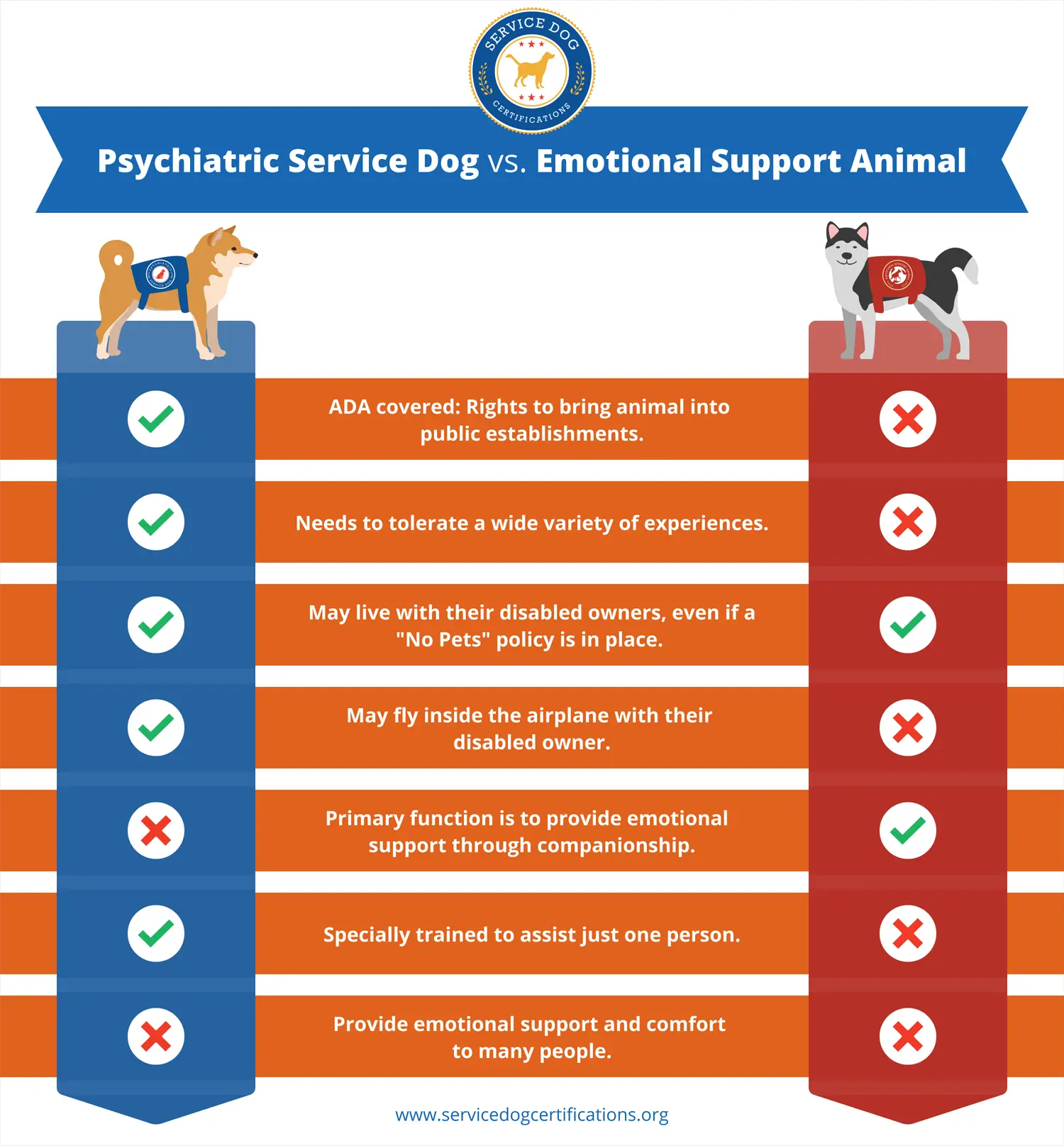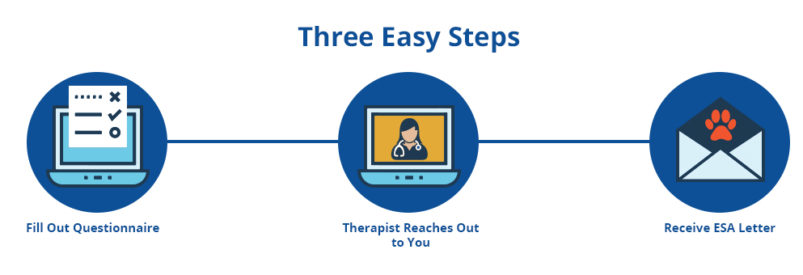Home Page › Blog › The Difference between a Psychiatric Service Dog and an Emotional Support Animal
The Difference between a Psychiatric Service Dog and an Emotional Support Animal

Dogs have historically performed all manner of tasks to assist humans in a variety of situations. For centuries farmers have used the intelligent and energetic nature of Border Collies to help them round up their livestock. Dogs are also incredibly useful in the treatment and therapy of various disabilities, both physical and mental. Perhaps the most well-known of these is the use of a specially trained dog to lead and assist its blind owner. However, dogs can be prescribed and recommended to patients to help treat their psychological disorders. There is often much confusion between the categories they fall under – Psychiatric Service Dogs and Emotional Support Animals. What are they exactly, and what are their differences?
If both categories are specifically aimed at alleviating the symptoms associated with various psychological disorders, how can they be differentiated? This question has led to many heated debates and confusion as to the rights of their owners and where the can and cannot bring their animals.
Share this image on your site
They both help to improve the mental health of their owners
As both Psychiatric Service Dogs and Emotional Support Animals are both provided to individuals to assist them in some way with psychological issues, it is easy to understand why some people may not understand the differences between them.
What is a Psychiatric Service Dog?
Dogs are commonly used to assist physically disabled people with everyday tasks, making their lives much easier than if they didn’t have them to help. These dogs are specifically trained to perform their designated tasks and behave considerably much better than typical pet dogs. All Service Dogs are protected under the Americans with Disabilities Act (ADA), allowing them to be exempt from most pet-related restrictions such as housing providers with a ‘no pet’ policy. This doesn’t apply only to physical disabilities, but to psychiatric disabilities as well. Psychiatric Service Dogs are therefore used by individuals whose mental impairment is so severe that it affects their ability to perform everyday tasks.
An example of this would be a mentally disabled person with a tendency to wander off in any direction when disoriented – a Psychiatric Service Dog would be trained and assigned to the individual to prevent them from walking onto busy roads.
What is an Emotional Support Animal?
While serving a similar service, Emotional Support Animals assist their owners as a part of their treatment plan. They do not assist individuals with everyday tasks, but rather they provide emotional comfort and help to improve the symptoms of certain psychological disorders.
The only physical aspect an Emotional Support Animal might provide, in contrast to a Service Animal, is that they may provide physical affection on command, or respond to playful activities. Emotional support animals do not have the same level of access as service dogs and are only allowed in planes for travel and in homes that normally do not allow pets.
How to get an ESA Letter Online
Federal Law sees both categories very differently
In the eyes of the law, it is only Service Dogs that are exempt from public restrictions for animals. For example, in usual circumstances, people are not allowed to bring their pets on board when flying on commercial airlines – they must transport them separately. However, the Americans with Disabilities Act stipulates that disabled individuals may travel with their certified Service Animals.
As Emotional Service Animals are merely assigned to people undergoing a therapeutic treatment plan or to provide emotional stability, and are not specially trained or certified, the ADA does not recognize them as a physical necessity. Therefore, Emotional Support Animals and their owners do not have the same overall rights as Psychiatric Service Dogs, although there are some exemptions.
While Psychiatric Service Animals may accompany their owners in public accommodation such as hotels, Emotional Support Animals may not. However, there are certain exceptions regarding private accommodation.
Many landlords and housing providers may often have a ‘no pets’ policy within their accommodation, but these policies can often be bypassed when it comes to Service Animals and Emotional Support Animals due to their prescribed therapeutic assistance to their owners.
Psychiatric Service Animals and Emotional Support Animals serve similar purposes, but have very different rights
While both Psychiatric Service Animals and Emotional Support Animals are prescribed to their owners to assist them with mental impairments, it is apparent that they are designated to serve different purposes. Individuals who have been diagnosed with a psychiatric disorder that is severe enough to impair their daily functioning will typically be assigned a Psychiatric Service Animal to assist them in their day to day activities, and are recognized by the ADA. By contrast, Emotional Support Animals do provide their owners psychological stability and therapy, but are not recognized by the ADA and therefore do not have as many rights under Federal Law.
About the Author: The writing team at Service Dog Certifications is made up of folks who really know their stuff when it comes to disability laws and assistance animals. Many of our writers and editors have service dogs themselves and share insights from their own experiences. All of us have a passion for disability rights and animals.
Latest Posts

How to Bring a Service Dog to Disneyland
Trained service dogs are more than welcome to join their handlers at Disneyland. In this guide, we’ll explain Disneyland’s policies and give practical advice for bringing a service dog to Disneyland for the first time. Disneyland’s Service Dog Policies The Magic Kingdom is happy to welcome trained service dogs across most park locations! They kindly […]

Read More

Can Dogs Eat Tomatoes?
Yes! Dogs can safely enjoy tomatoes, but there are a few risks to be aware of so you can feed your dog responsibly. Fully ripe tomatoes (without the stems and leaves) can actually have nutrients that are good for your pup. Tomatoes have chlorogenic acid, an antioxidant that can have anti-inflammatory effects in cells. They’re […]

Read More

Can a Primary Care Doctor Write an ESA Letter?
Your family doctor, also called a primary care physician (PCP), can write a letter recommending an emotional support animal. We’ll explain what legally gives them that ability and explore what better options might be available for you. Why are Physicians Able to Write an ESA Letter? To turn your pet into an emotional support animal, […]

Read More









Did I need to show my service dog skills in order to be allowed entrance into a business?
No, third parties cannot require you to have your dog demonstrate its disability related task as a condition to entry.
But what do you do if you and your dog fall somewhere in between? My dog isn’t trained for specific tasks but I can’t function without him nonetheless. What am I to do when I simply need my dog’s presence to be able to do what normal people take for granted? I don’t have the same rights because I only need his presence and not specific tasks? That seems unnecessarily cruel.
I already have a note that allows me to have an emotional support animal in my home. However, I had to replace her when we had to put her to sleep. My new dog has had a litter of puppies, that we would like to train as either an ESA, or as an PSA. What do we have to keep the 6 week old pups until they are old enough to train for these type of service animals?
Hoping to get my dog registered as an ESA. I’m diagnosed with panic disorder, anxiety, and crippling obsessive compulsive disorder. do you think I qualify?
For anxiety and compulsive disorders, an ESA could be beneficial. But to qualify for an ESA, your licensed mental health professional must diagnose your mental health disability and agree that a dog would be helpful as your treatment. Once approved, your therapist will issue an ESA letter, which will make you eligible for owning an ESA. You may find this article on how to qualify for an ESA interesting.
https://www.servicedogcertifications.org/how-to-qualify-for-an-emotional-support-animal/